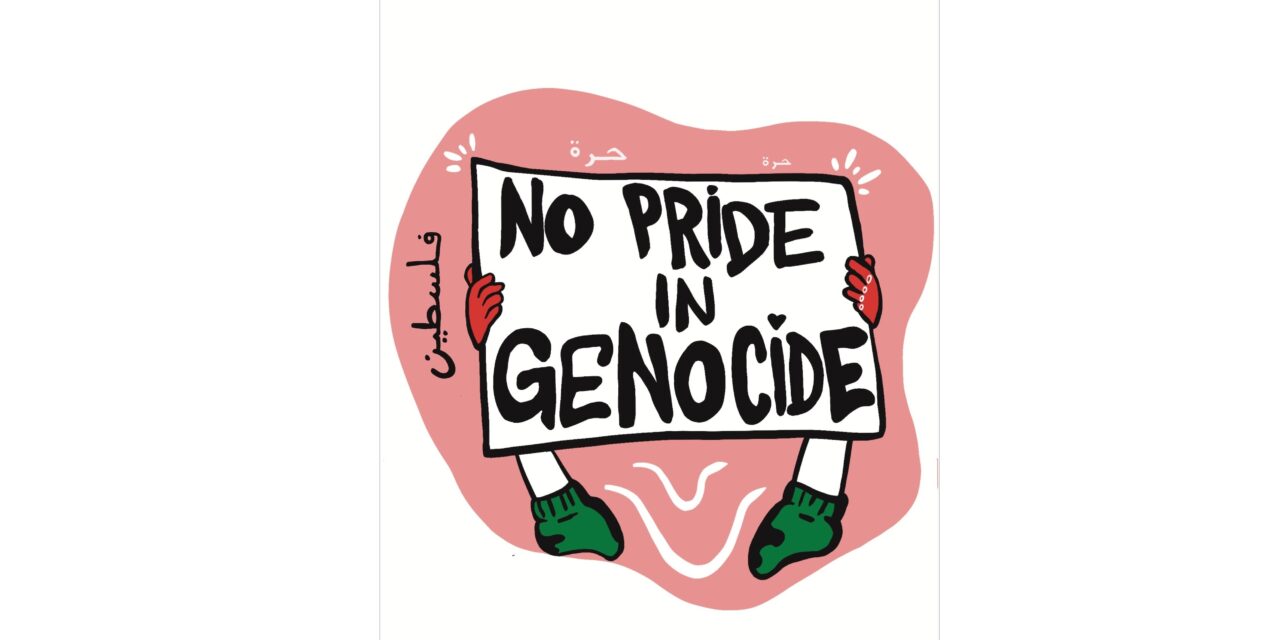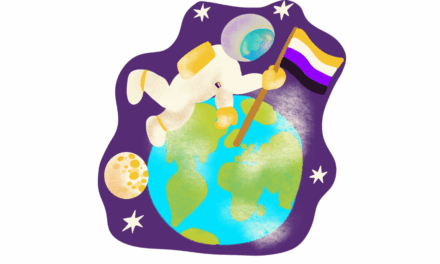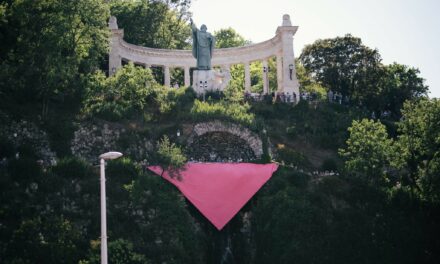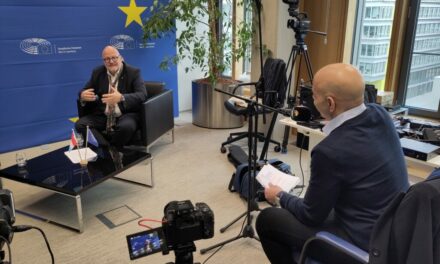“My biggest regret is not kissing this one guy. He died two days back. [… ] in the bombing. I think a big part of me died too. And soon I will be dead. To younus, i will kiss you in heaven.” This message was uploaded to Queering the Map and retells a story of queer love near the city of Beit Hanoun in the North of the Gaza Strip.
The writer speaks of regrets they feel for not having kissed someone, the pain they felt at the death of this person, and the expectation of their own death as they make it clear that they refuse to abandon their home in the face of occupation and invasion. Unable to track the date or the person who posted this, we do not know which bombing their loved one died in, nor do we know if the writer themselves has survived the 299 days of genocide in Gaza.
Today, Beit Hanoun ranks among the first globally in terms of child deaths to malnutrition and dehydration as 500,000 people in northern Gaza are facing starvation. This threat of famine is man made and due to the limitations on aid deliveries enacted by the Israeli authorities. When aid does enter Gaza, people are at risk of death when seeking it out. On February 29th 2024, at least 118 Palestinians were killed in Gaza City when they were seeking food from aid trucks in what came to be known as the flour massacre.
Journalist Afeef Nessouli has been sharing messages he receives from Gazans on his social media accounts. One of the people he is in touch with is a gay man referred to as QFG (queer friend in Gaza). QFG messages Afeef about his dreams of growing out his hair, modeling, and working. He also messages Afeef about the fear he feels as Rafah is attacked (16/04/24); “They are obliterating the whole area. So clooose. The whole area Shaking. I’m scared.”
The night from May 11th to May 12th marks the ground invasion of the city of Rafah, the only so-called safe zone in the Gaza Strip. The “safe” zone of Rafah had already experienced bombings for weeks preceding the ground invasion. An invasion that was announced to the people in Rafah by leaflets dropped from Israeli airplanes, telling them to evacuate. The question of where to go, considering that people had been displaced to Rafah from all over Gaza in search of safety and protection, goes unanswered.
Rafah’s border crossing into Egypt had been the destination of many displaced Palestinians as they attempted to gather enough money for themselves and their families to pass through. Before October 7th 2023, passing into Egypt cost around 350$ per person, today the price for one adult is at around 5000$ – more than a year’s salary in Gaza. However, on May 7th 2024 this crossing into Egypt closed, leaving people no choice but to stay in Rafah despite the evacuation order, or to move northwards into the Gaza Strip again.
Khan Younis, a city previously evacuated in the face of invasion, has become a destination for many people fleeing Rafah. A city where at least 392 bodies have been discovered in three separate mass graves near the Nasser Hospital. Many of these bodies remain unidentified due to mutilation or decomposition.
Confronted with these accounts from Palestinians, including queer Palestinians, who are enduring a genocide that has killed at least 37000 people since October 7th 2023, queer solidarity movements with Palestine have taken a stand on a global scale. This surge in mobilization has been accompanied by increased scrutiny. A cursory Facebook search reveals a wave of posts ridiculing and belittling pro-Palestinian queer people and collectives through statements claiming that “if they travelled to Gaza, Hamas would kill them for being queer.”
Such statements reflect colonial discourse and propagate what the Palestinian grassroots organization AlQaws describe as “a binary between Palestinian backwardness and Israeli progressiveness.”
Palestinian society is painted as “inherently queerphobic and misogynistic,” victimizing queer Palestinians while simultaneously negating their existence and resilience. Conversely, Israel is portrayed as a democracy that values queer- and women’s rights, with Tel Aviv hailed as the gay capital of the Middle East. This narrative is not incidental but a deliberate strategy known as “pinkwashing”, officially adopted by Israel in 2005, when it launched the Brand Israel campaign.
Pinkwashing involves Israel co-opting LGBTQI+ rights language to project a progressive image while diverting attention from its oppression of Palestinians. As Israel seeks to win the support of queer communities worldwide, it uses Islamophobia and racist anti-Arab sentiments to draw a picture of Palestinians as “sexually regressive and therefore undeserving of solidarity.” Furthermore, Israel offers “liberation” to queer Palestinians by means of settler-colonialism, military occupation, and apartheid policies.
AlQaws explains; “ The pervasive myth of Palestinians finding “queer refuge” in Israeli cities flies in the face of the actual policies of the colonial state, which are premised on the exclusion and destruction of Palestinians—queer, trans, or otherwise. The fantasy of Israeli humanitarianism falls apart as soon as the colonial situation is taken into account. There is no “pink door” in the apartheid wall.”
…..
On November 12th 2023, Lee Kern tweeted two pictures with the caption “LIBERATION 🏳️🌈 THE FIRST EVER PRIDE FLAG RAISED IN GAZA.” The state of Israel’s official X (formally Twitter) account shared the same images the next day; showing IDF soldiers holding pride flags to “send a message of hope to the people of Gaza living under Hamas brutality.”
The initial image shows an IDF soldier holding a pride flag that reads “In The Name of Love” in English, Arabic and Hebrew while standing in the rubble of a Palestinian town in Gaza.The subsequent image reveals an IDF soldier holding a rainbow-Israeli flag in front of a line of tanks.
This display of a “message of hope” starkly contrasts with the accounts of queer Palestinians mentioned earlier. Notably absent from this portrayal are the fear, injuries, death, grief, torture, displacement, and trauma inflicted by these same IDF forces on Palestinians, including queer Palestinians and their loved ones.
And so the supposed queer liberatory image of the IDF becomes obscured. This narrative further loses credibility when examining Danny Kaplan’s book “Brothers and Others in Arms” that was published in 2003.
In it, an IDF veteran recounts the story of an Israeli sniper who saw two Arab men having sex; “I saw two mehablim [terrorists], one fucking the other in the ass; it was pretty funny. Like real animals. […] He [the Israeli sniper] aims, and puts a bullet right into the forehead of the one that was being fucked.”
…..
After more than 9 months of a genocide which killed tens of thousands of people, injured thousands more and displaced over a million – not to mention decades of enduring occupation in apartheid conditions – we are nearing Pride month. A month to celebrate our queer identities and to stand in solidarity and protest with queer people around the world. A month during which we will seemingly continue to look away from Palestine and Israel, while IDF soldiers persist in their mission to bring hope to queer Palestinians through acts of invasion, occupation, and violence.
Our Luxembourgish willingness to look away from the genocide in Gaza has been conspicuous. Most recently, on May 11th when, despite global calls for boycott, we engaged in viewing Eurovision, holding watch parties, voting and even giving Luxembourg’s 12 national points to Israel. We listened to the song of Tali Golgerant, Luxembourg’s pick for the Eurovision Song Contest, and we rejoiced with her as she thought of her brother serving in the IDF in Gaza while she sang.
The mass protests around the world do not seem to affect us very much, even as universities across continents are occupied by students calling for justice for the Palestinian people. As Rafah saw a ground invasion on the same night as the Eurovision Grand Final, Luxembourg’s population seemed happy to tune in and enjoy the music.
…..
To better comprehend this passive Luxembourgish response to the genocide in Gaza – and the military occupation of Palestinians in general – I conversed with Gabrielle Antar from the collective Waassermeloun. The collective was founded in November 2023 to raise awareness about Palestinian liberation struggle and a more global decolonial struggle. Waassermeloun works in close cooperation with the Luxembourgish section of the global BDS (Boycott, Divest, Sanction) movement. Through this cooperation, Waassermeloun seeks to encourage people to take action in support of Palestine and to join the BDS call to pressure Israel into compliance with international law.
Gabrielle Antar explains that many Luxembourgish people feel they do not know enough about the occupation of Palestine which they, incorrectly, believe justifies their silence on the matter. “With Waassermeloun what we try to do is to expose that silence is complicity, ” says Gabrielle.
Complicity in Luxembourg is the silence of the general population. It is also the racist refusal to value knowledge production rooted in the narratives, sources, experiences, and demands of Palestinians and Arabs alike, even in so-called pro-Palestinian circles.
We devalue Arab- and Palestinian knowledge production when we ignore it and refuse to call things by their name – more specifically genocide, apartheid, settler violence, and military occupation. We also devalue Arab- and Palestinian knowledge production when we vilify Palestinian resilience and resistance – the legitimacy of which is inscribed in international law.
The United Nations Charter recognizes the legitimacy of resistance by all means, including armed struggle, of those seeking “independence, […] and liberation from colonial and foreign domination, and foreign occupation.”
BDS Luxembourg is working to expose complicity in Luxembourg. A complicity that is exemplified through activities like the collaboration between RTL, Luxembourg’s main Broadcaster, and AVOXVISION, an Israeli production Media studio. AVOXVISION designed the cover art for “the openly genocidal Nr.1 hit” Habu Darbu, and creates visuals that idealize and endorse the same IDF military that we see posting pictures of themselves holding pride flags in Gazan rubble.
BDS Luxembourg has also called attention to the 5-year contract that NATO recently signed with Elbit Systems – an Israeli arms and military technology company that collaborates with the IDF, provides surveillance technology to the illegal wall in the West Bank, and field tests its weapons and systems on Palestinians living under Israeli military occupation. This NATO contract has led to the establishment of an Elbit Systems service centre, located at the NATO Support and Procurement Agency (NSPA) in Capellen, Luxembourg.
Considering all this, we see that Palestine is not so distant from us after all and that by choosing silence and neutrality, we are indeed choosing the side of the oppressor – one that indiscriminately invades, occupies, and kills “in the Name of Love.”
If we seek to end our complicity, it is crucial to change the way we think and look at the world – a change of consciousness that Gabrielle identifies as fundamental to solidarity. It is this change of consciousness that Waassermeloun has sought to contribute to since its establishment in November 2023.
By organizing and curating events, Waassermeloun is dedicated to raising awareness and it acts as a first-contact point for all those of us who feel that we do not know enough to speak up. Waassermeloun’s screening of films about important historical events (such as the Palestinian Nakba of 1948 – [organised with BDS Luxembourg]) and historical figures (such as Leila Khaled and Ghassan Kanafani) allow people in Luxembourg to learn about the history of Palestine and to understand the importance of its liberation.
It is by learning from our history – and that of others – that we can identify our own complicity and change. Centering Palestinian voices will enable us to understand the deep love and admiration that Palestinians have for their culture and their land – a love and admiration that cannot be explained by Western notions of nationalism. When looking at Palestine we see time and time again how Western ideas, concepts, and categories fall short in containing the beauty and complexity of a people, a culture, a history, and a place. It is by decentralising these narratives that we can grow beyond their confines.“Centre and amplify Palestinian voices!”, urges Gabrielle. Then we will be able to hear what queer Palestinians have long been talking about – colonial structures of oppression, erasure, pinkwashing, and complicity. The time has come for us to listen to them, to learn their history, and to act.
Illustration: Liou





